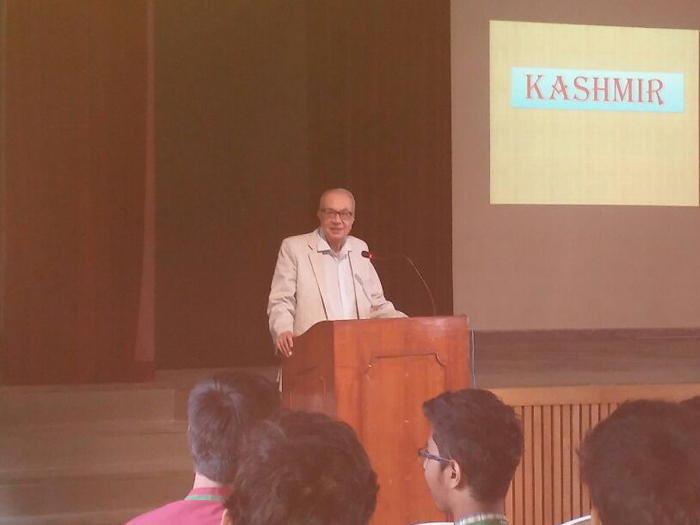The Chairman enlighten students on Kashmir
The lovely vale, whose name was the last word that passed the lips of a dying Moghul, has today taken its place alongside Palestine and Korea in the gallery of the worlds unsolved problems. On 25th October 2016, our chairman Shri Prafull Goradia as part of his student enrichment endeavour took upon the task of offering an insight into the Kashmir issue, to the students of classes XI and XII (Humanities).
Shri Goradia began his session with the early history of Kashmir. He enlightened students about Gulab Singh, the first ruler of Jammu and Kashmir. The princely state was created after the First Anglo Sikh War under the terms of the Treaty of Amritsar in which the British sold Kashmir to Gulab Singh. Further expansions in later years made Jammu and Kashmir the largest princely state in British India at the time of partition in 1947.
Shri Goradia also spoke about the treacherous policy of the Subsidiary Alliance as devised by Lord Wellesley, under which the British would take responsibility of protecting an ally princely state. For this, they would station British forces in the ally territory but the salary would be provided by the state. The Indian maharajas were paying salaries to the forces even though the forces belonged to the British. Further, they were to keep a British resident in their courts who would inform about day to day governance and in case of any anti British activity, the state would be annexed in the name of misgovernance!
[gallery link="file"]
The Kashmir problem came into being with the independence of India. At the time, there were around 565 princely states. These were given 3 options, they could either a) accede to India, (b) accede to Pakistan (c) or become independent. No serious difficulties arose in the case of the other states. But the position of Kashmir is unique. It is contiguous both with India and Pakistan, so it could accede to either of them. Both desired it, for the state is not only considered heaven upon earth, but also strategically located from a military point of view. While it was ruled by a Hindu Maharaja, its population was predominantly Muslim. In this fact, lay the real problem and Pakistan claimed it as its own.
The maharaja of Jammu and Kashmir, Hari Singh was hesitating, unsure about whether to join India or Pakistan, in the months preceding independence. However, when Pakistan encouraged war-like tribes to forcefully enter the with the Pakistan army, the maharaja quickly acceded to India and urgently requested help. Indian armies were flown to Srinagar immediately, and the invaders were removed from the valley. This decision was viewed as fraudulent, unfair, and illegitimate by the Pakistani government. As India wanted to avoid an all-out war, it appealed to the UN Security Council against Pakistan. A ceasefire was declared immediately, as a result of which Pakistan remained and still remains, in illegal possession of a part of the state which is called Azad Kashmir by it.
help. Indian armies were flown to Srinagar immediately, and the invaders were removed from the valley. This decision was viewed as fraudulent, unfair, and illegitimate by the Pakistani government. As India wanted to avoid an all-out war, it appealed to the UN Security Council against Pakistan. A ceasefire was declared immediately, as a result of which Pakistan remained and still remains, in illegal possession of a part of the state which is called Azad Kashmir by it.
The U.N. then made various efforts to settle the dispute peacefully. The resolution provided that (1) Pakistan would withdraw all its forces from the state. (2) the Azad Kashmir government and its forces would be disbanded, and (3) when conditions permit, India too, would gradually withdraw her forces. Time passed, but Pakistan did not withdraw her forces nor did it disband the Azad Kashmir Government. Every year it complained to the U.N. that India was oppressing the Kashmiri muslims and that Islam was in danger. On various occasions, Pakistan was guilty of violations of the ceasefire line. Power politics of the big powers also came in the way of a just solution to this dispute.
In more recent times, there has been a considerable deterioration in the situation in Kashmir. The Pakistan-trained subversives have infiltrated into the valley in large numbers. The slogan, Azad Kashmir has been used to misguide the people. Violence still continues, life in the state is insecure and thousands have migrated from the valley into Jammu, Delhi and other parts of the country. The Kashmir problem is the most serious problem that India faces today.
Shri Goradia through his visual and verbal historiography was able to tackle a number of questions after the brief he gave on the Kashmir issue and created a background for more.
he gave on the Kashmir issue and created a background for more.
There was one message which was loud and clear, that is, if both India and Pakistan cooperate, they will be better off. They will
avoid a great number of casualties. In relation to the proliferation of their nuclear capabilities, if both India and Pakistan refrain from communicating (diplomatically through vocal, cooperative or bargaining tactics) and choose to continue with the build-up of their respective nuclear arsenals, both India and Pakistan will rise in the escalation ladder that might not be able to be stopped or managed later.
Ms. Charu Bhatnagar Singh.














